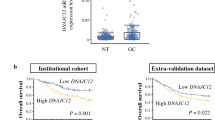Abstract
Background
Gastric cancer is one of the most frequently diagnosed malignancies in the world. The gene expression profile and molecular grouping of gastric cancer has been a challenging task due to its inherent complexity and variation among individuals.
Aims
To determine the molecular mechanism associated with gastric carcinogenesis.
Methods
We analyzed the gene expression profiles of 20 cancerous tissues and their tumor-adjacent tissue from patients with gastric cancer by using a 14 K cDNA microarray. The differentially expressed genes and their products were verified by semiquantitative reverse transcription PCR (RT-PCR), western blotting and immunohistochemistry of gastric cancer and normal tissue samples.
Results
A total of 69 genes were found to be differentially regulated in the cancerous tissue. Among them, genes such as CDH17, ETV4, S100A6, S100A11, Ephb4, and KLK10 were confirmed by RT-PCR to be up-regulated, while genes such as NK4 and PPP2R1B were down-regulated. Western blotting and immunohistochemistry indicated that Ephb4 was over-expressed and localized to the cytoplasm of gastric cancer cells. Moreover, Ephb4 protein was observed as being significantly related to tumor size and pN category (p = 0.001 and 0.007, respectively).
Conclusions
These newly identified genes might provide a valuable resource for understanding the molecular mechanism associated with the carcinogenesis of gastric cancer and for finding potential diagnostic markers of gastric cancer.




Similar content being viewed by others
References
Akoh JA, Macintyre IMC. Improving survival in gastric cancer—review of 5-year survival rates in English language publications from 1970. Br J Surg. 1992;79:293–299.
Stadtlander CTKH, Waterbor JW. Molecular epidemiology, pathogenesis and prevention of gastric cancer. Carcinogenesis. 1999;20:2195–2207.
Inoue H, Matsuyama A, Mimori K, Ueo H, Mori M. Prognostic score of gastric cancer determined by cDNA microarray. Clin Cancer Res. 2002;8:3475–3479.
Kim JM, Sohn HY, Yoon SY, Oh JH, Yang JO, et al. Identification of gastric cancer-related genes using a cDNA microarray containing novel expressed sequence tags expressed in gastric cancer cells. Clin Cancer Res. 2005;11:473–482.
Sriuranpong V, Mutirangura A, Gillespie JW, Patel V, Amornphimoltham P, et al. Global gene expression profile of nasopharyngeal carcinoma by laser capture microdissection and complementary DNA microarrays. Clin Cancer Res. 2004;10:4944–4958.
Lauren P. The two histological main types of gastric carcinoma. Diffuse and so-called intestinal type carcinoma: an attempt at histological classification. Acta Pathol Microbiol Scand. 1965;64:31–49.
Nashimoto A, Yabusaki H, Nakagawa S. Evaluation and problems of follow-up surveillance after curative gastric cancer surgery. Nippon Geka Gakkai Zasshi. 2007;108:120–124.
Wen YG, Wang Q, Zhou CZ, Qiu GQ, Peng ZH, Tang HM. Mutation analysis of tumor suppressor gene PTEN in patients with gastric carcinomas and its impact on PI3 K/AKT pathway. Oncol Rep. 2010;24:89–95.
Li QF, Yao RY, Liu KW, Lv HY, Jiang T. Liang J. Genetic polymorphism of GSTP1: prediction of clinical outcome to oxaliplatin/5-FU-based chemotherapy in advanced gastric cancer. J Korean Med Sci. 2010;25:846–852.
Wu MS, Lin YS, Chang YT, Shun CT, Lin MT, Lin JT. Gene expression profiling of gastric cancer by microarray combined with laser capture microdissection. World J Gastroenterol. 2005;11:7405–7412.
Wu Q, Suo Z, Kristensen GB, Baekelandt M, Nesland JM. The prognostic impact of EphB2/B4 expression on patients with advanced ovarian carcinoma. Gynecol Oncol. 2006;102:15–21.
Xia G, Kumar SR, Masood R, Zhu S, Reddy R, et al. EphB4 expression and biological significance in prostate cancer. Cancer Res. 2005;65:4623–4632.
Noren NK, Lu M, Freeman AL, Koolpe M, Pasquale EB. Interplay between EphB4 on tumor cells and vascular ephrin-B2 regulates tumor growth. Proc Natl Acad Sci USA. 2004;101:5583–5588.
Das A, Shergill U, Thakur L, et al. Ephrin B2/EphB4 pathway in hepatic stellate cells stimulates Erk-dependent VEGF production and sinusoidal endothelial cell recruitment. Am J Physiol Gastrointest Liver Physiol. 2010;298:G908–G915.
Weinsheimer S, Kim H, Pawlikowska L, et al. EPHB4 gene polymorphisms and risk of intracranial hemorrhage in patients with brain arteriovenous malformations. Circ Cardiovasc Genet. 2009;2:476–482.
Vincan E, Darcy PK, Smyth MJ, Thompson EW, Thomas RJ, et al. Frizzled-7 receptor ectodomain expression in a colon cancer cell line induces morphological change and attenuates tumor growth. Differentiation. 2005;73:142–153.
Vimalachandran D, Greenhalf W, Thompson C, Lüttges J, Prime W, et al. High nuclear S100A6 (Calcyclin) is significantly associated with poor survival in pancreatic cancer patients. Cancer Res. 2005;65:3218–3225.
Liu XG, Wang XP, Li WF, et al. Fan ZM.Ca2+-binding protein S100A11: a novel diagnostic marker for breast carcinoma. Oncol Rep. 2010;23:1301–1308.
White NM, Chow TF, Mejia-Guerrero S, et al. Three dysregulated miRNAs control kallikrein 10 expression and cell proliferation in ovarian cancer. Br J Cancer. 2010;102:1244–1253.
Oue N, Hamai Y, Mitani Y, Matsumura S, Oshimo Y, et al. Gene expression profile of gastric carcinoma: identification of genes and tags potentially involved in invasion, metastasis, and carcinogenesis by serial analysis of gene expression. Cancer Res. 2004;64:2397–2405.
Yamamoto H, Horiuchi S, Adachi Y, Taniguchi H, Nosho K, et al. Expression of ets-related transcriptional factor E1AF is associated with tumor progression and over-expression of matrilysin in human gastric cancer. Carcinogenesis. 2004;25:325–332.
Jiang WG, Hiscox SE, Parr C, Martin TA, Matsumoto K, et al. Antagonistic effect of NK4, a novel hepatocyte growth factor variant, on in vitro angiogenesis of human vascular endothelial cells. Clin Cancer Res. 1999;5:3695–3703.
Mollenhauer J, Herbertz S, Helmke B, Kollender G, Krebs I, et al. Deleted in malignant brain tumors 1 is a versatile mucin-like molecule likely to play a differential role in digestive tract cancer. Cancer Res. 2001;61:8880–8886.
Inoue K, Kohno T, Takakura S, Morishita K, Takita J, et al. Alterations of the PPP1R3 gene in human cancer. Cancer Res. 1999;59:4170–4174.
Hemmer S, Wasenius VM, Haglund C, Zhu Y, Knuutila S, et al. Alterations in the suppressor gene PPP2R1B in parathyroid hyperplasias and adenomas. Cancer Genet Cytogenet. 2002;134:13–17.
Author information
Authors and Affiliations
Corresponding author
Rights and permissions
About this article
Cite this article
Li, M., Zhao, Z.W., Zhang, Y. et al. Over-Expression of Ephb4 Is Associated with Carcinogenesis of Gastric Cancer. Dig Dis Sci 56, 698–706 (2011). https://doi.org/10.1007/s10620-010-1346-7
Received:
Accepted:
Published:
Issue Date:
DOI: https://doi.org/10.1007/s10620-010-1346-7




